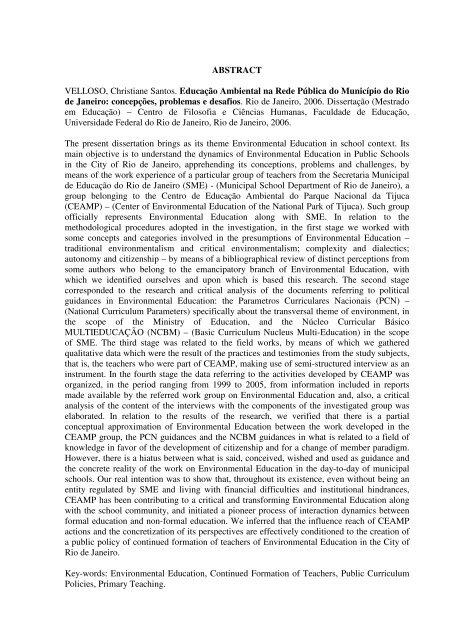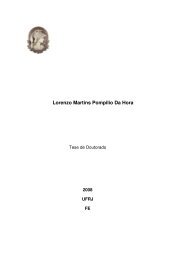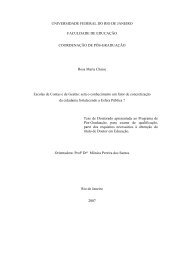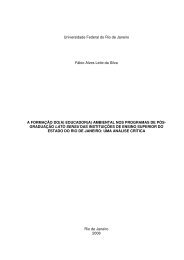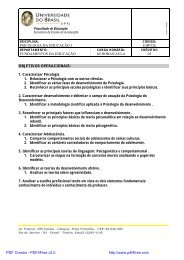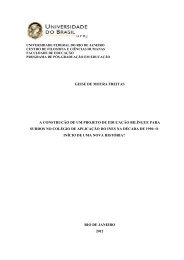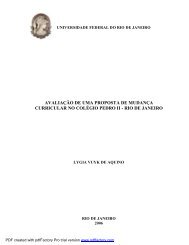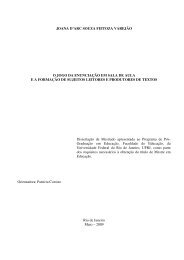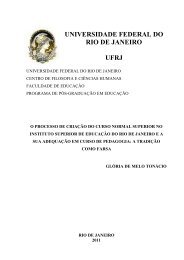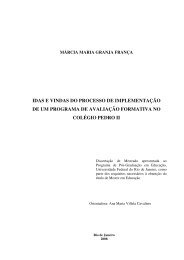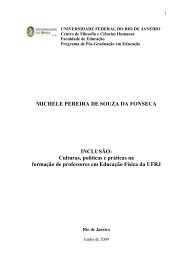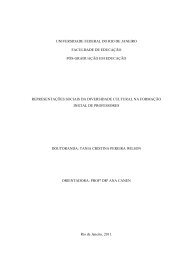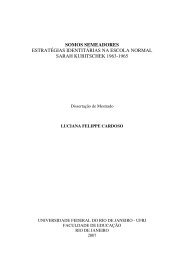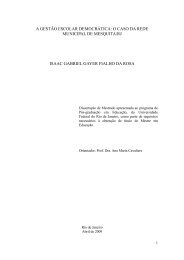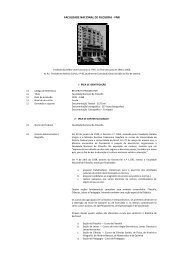Educação ambiental na rede pública do município do Rio de Janeiro
Educação ambiental na rede pública do município do Rio de Janeiro
Educação ambiental na rede pública do município do Rio de Janeiro
You also want an ePaper? Increase the reach of your titles
YUMPU automatically turns print PDFs into web optimized ePapers that Google loves.
ABSTRACT<br />
VELLOSO, Christiane Santos. <strong>Educação</strong> Ambiental <strong>na</strong> Re<strong>de</strong> Pública <strong>do</strong> Município <strong>do</strong> <strong>Rio</strong><br />
<strong>de</strong> <strong>Janeiro</strong>: concepções, problemas e <strong>de</strong>safios. <strong>Rio</strong> <strong>de</strong> <strong>Janeiro</strong>, 2006. Dissertação (Mestra<strong>do</strong><br />
em <strong>Educação</strong>) – Centro <strong>de</strong> Filosofia e Ciências Huma<strong>na</strong>s, Faculda<strong>de</strong> <strong>de</strong> <strong>Educação</strong>,<br />
Universida<strong>de</strong> Fe<strong>de</strong>ral <strong>do</strong> <strong>Rio</strong> <strong>de</strong> <strong>Janeiro</strong>, <strong>Rio</strong> <strong>de</strong> <strong>Janeiro</strong>, 2006.<br />
The present dissertation brings as its theme Environmental Education in school context. Its<br />
main objective is to un<strong>de</strong>rstand the dy<strong>na</strong>mics of Environmental Education in Public Schools<br />
in the City of <strong>Rio</strong> <strong>de</strong> <strong>Janeiro</strong>, apprehending its conceptions, problems and challenges, by<br />
means of the work experience of a particular group of teachers from the Secretaria Municipal<br />
<strong>de</strong> <strong>Educação</strong> <strong>do</strong> <strong>Rio</strong> <strong>de</strong> <strong>Janeiro</strong> (SME) - (Municipal School Department of <strong>Rio</strong> <strong>de</strong> <strong>Janeiro</strong>), a<br />
group belonging to the Centro <strong>de</strong> <strong>Educação</strong> Ambiental <strong>do</strong> Parque Nacio<strong>na</strong>l da Tijuca<br />
(CEAMP) – (Center of Environmental Education of the Natio<strong>na</strong>l Park of Tijuca). Such group<br />
officially represents Environmental Education along with SME. In relation to the<br />
metho<strong>do</strong>logical procedures a<strong>do</strong>pted in the investigation, in the first stage we worked with<br />
some concepts and categories involved in the presumptions of Environmental Education –<br />
traditio<strong>na</strong>l environmentalism and critical environmentalism; complexity and dialectics;<br />
autonomy and citizenship – by means of a bibliographical review of distinct perceptions from<br />
some authors who belong to the emancipatory branch of Environmental Education, with<br />
which we i<strong>de</strong>ntified ourselves and upon which is based this research. The second stage<br />
correspon<strong>de</strong>d to the research and critical a<strong>na</strong>lysis of the <strong>do</strong>cuments referring to political<br />
guidances in Environmental Education: the Parametros Curriculares Nacio<strong>na</strong>is (PCN) –<br />
(Natio<strong>na</strong>l Curriculum Parameters) specifically about the transversal theme of environment, in<br />
the scope of the Ministry of Education, and the Núcleo Curricular Básico<br />
MULTIEDUCAÇÃO (NCBM) – (Basic Curriculum Nucleus Multi-Education) in the scope<br />
of SME. The third stage was related to the field works, by means of which we gathered<br />
qualitative data which were the result of the practices and testimonies from the study subjects,<br />
that is, the teachers who were part of CEAMP, making use of semi-structured interview as an<br />
instrument. In the fourth stage the data referring to the activities <strong>de</strong>veloped by CEAMP was<br />
organized, in the period ranging from 1999 to 2005, from information inclu<strong>de</strong>d in reports<br />
ma<strong>de</strong> available by the referred work group on Environmental Education and, also, a critical<br />
a<strong>na</strong>lysis of the content of the interviews with the components of the investigated group was<br />
elaborated. In relation to the results of the research, we verified that there is a partial<br />
conceptual approximation of Environmental Education between the work <strong>de</strong>veloped in the<br />
CEAMP group, the PCN guidances and the NCBM guidances in what is related to a field of<br />
knowledge in favor of the <strong>de</strong>velopment of citizenship and for a change of member paradigm.<br />
However, there is a hiatus between what is said, conceived, wished and used as guidance and<br />
the concrete reality of the work on Environmental Education in the day-to-day of municipal<br />
schools. Our real intention was to show that, throughout its existence, even without being an<br />
entity regulated by SME and living with fi<strong>na</strong>ncial difficulties and institutio<strong>na</strong>l hindrances,<br />
CEAMP has been contributing to a critical and transforming Environmental Education along<br />
with the school community, and initiated a pioneer process of interaction dy<strong>na</strong>mics between<br />
formal education and non-formal education. We inferred that the influence reach of CEAMP<br />
actions and the concretization of its perspectives are effectively conditioned to the creation of<br />
a public policy of continued formation of teachers of Environmental Education in the City of<br />
<strong>Rio</strong> <strong>de</strong> <strong>Janeiro</strong>.<br />
Key-words: Environmental Education, Continued Formation of Teachers, Public Curriculum<br />
Policies, Primary Teaching.


